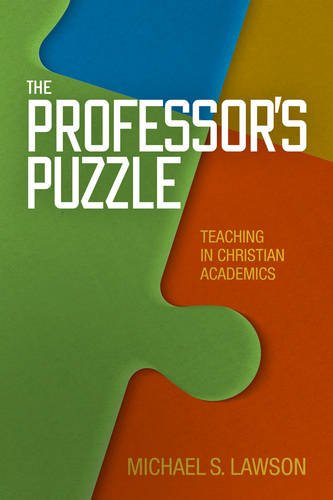Reviewed by Eric Tully
Introduction
Anyone who has spent time as a student has taken courses from excellent teachers…and courses from teachers that, well, could benefit from some self-reflection about their craft. Teaching is difficult. And many of us, whether we teach in a high school, college, graduate school, or more informally at church, spend so much time mastering our content that we forget to consider what kind of environment we are creating and what students are actually learning. The Professor’s Puzzle is an excellent introduction to the major aspects of teaching for those who are just getting started or those who need a refresher.
Michael Lawson is senior professor of educational ministries and leadership at Dallas Theological Seminary and coordinator of the doctor of educational ministries degree. He writes in the preface that while a number of good books exist for professor enrichment, there has been nothing to guide aspiring teachers into their new roles. Historically, acquiring a PhD meant mastery of (increasingly specific) content, but not necessarily any training in how to teach (xi). He writes, “I designed the Professor’s Puzzle to guide aspiring teachers through the initial shock of moving from the extended period of independent research required for their PhD to classroom teaching” (xii). He adds that teachers in Christian secondary schools are sometimes not required to maintain the same educational certification as public school teachers, and he hopes that they also find that the book fills in some “training cracks” (xii).
Summary
Lawson’s writing is informal, accessible, engaging and interesting. Throughout the book he sprinkles in real-life examples from the classroom and wise advice gained from years of experience. One has the sense of sitting in a course and working through each aspect of the teaching task. In addition, Lawson considers everything from the perspective of Christian theology and a Christian philosophy of education. He is writing to Christian educators and states that Christian theology should “permeate everything in our educational system—from the president’s office to the janitor’s closet…” (xiii).
The book contains ten chapters and three appendices. In chapter 1, “A Philosophy for Christian Academic Education,” Lawson begins by identifying the Bible as the starting place for wisdom as it begins with the source of wisdom, God the creator (2). Most of the chapter is organized around ten topics or questions which a teacher can use to formulate a philosophy of education. These are: Goals, Learners, Curriculum, Teachers, Learning Theory, Methodologies, Measurements, Rules, Technology, and Communication. The last six of these topics have whole chapters devoted to them later in the book.
In chapter 2, “Helping Students and Professors Integrate Learning,” Lawson is concerned with education within a thoroughly Christian worldview and framework. He writes that dominant worldview of naturalism is deficient as an explanation of life and yet it characterizes much of our education and understanding. Our students also arrive in our schools with varying degrees of belief in this system (40). “A good many only have Christianity dusted on the edges of their education, if at all” (41). The chapter goes on to discuss the components of a fully integrated life and curriculum in which a Christian worldview (i.e. truth) is at the center of a unified perspective.
Chapters 3 (“Learning Theories for Practitioners”), 4 (“Planning Skills in Syllabus Design”), and 5 (“Mastering Content”), discuss practical advice for the content of our teaching. Lawson describes theories of learning such as learning domains and Maslow’s Hierarchy of Needs, demonstrating how a basic knowledge of these issues leads to more intentional instruction and motivation for students. He states that he brainstorms with a blank notepad and jots down everything he can think of related to the subject. He then grades the items (for example, a “1” means “absolutely essential”) and considers how they correspond to the course objectives (102). Lawson considers all of these issues from a Christian perspective, urging virtues such as humility and warning against the temptation to pride. He concludes with the point that “Content Mastery is More about What You Do with What You Know than Merely What You Know” (124).
Chapters 6 (“Managing Skills: The Classroom Experience”), 7 (“Evaluating Skills: Assessing Students, Courses, and Professors”) and 8 (“Instructing Skills: Using Appropriate Variety”) discuss the aspects of actual teaching in the classroom. Lawson describes the kind of learning environment we should seek to create, including the arrangement of the room, clock management, and necessary equipment. In chapter 7 he describes the strengths and weaknesses of different kinds of tests and explores creative options such as group testing and the evaluations of specific tasks. In Chapter 8 he discusses good lecture techniques and recommends ways to generate significant discussion among students.
Chapters 9 (“Relating Skills: A Particularly Christian Idea”) and 10 (“Institutional Realities”) discuss aspects of being a teacher outside the classroom. He helpfully describes dynamics such as position vs. rank, common problems in the classroom (such as over talkative students or students who sleep in class), potential legal issues, funding, enrollment, accreditation, faculty workload, professional development and tenure.
The appendices include a sample syllabus (A), a teacher behaviors inventory (B), and instructions for creating a proper outline (C).
Evaluation
One can see from the preceding survey that the book covers a lot of ground. Yet, as an introduction and overview it is very successful. Lawson briefly mentions some issues but goes into greater depth on others that are more complex or that he deems to be more crucial. He often recommends resources for further reading. This book would be an excellent introduction for (1) students considering teaching as a profession/ministry and wondering what they are getting themselves into; (2) PhD students or new teachers about to begin teaching a course; (3) current teachers who would like a refresher course. Highly recommended.
Eric Tully is Assistant Professor of Old Testament and Semitic Languages at Trinity Evangelical Divinity School. His is also Review Editor for Old Testament here at Books At a Glance.
